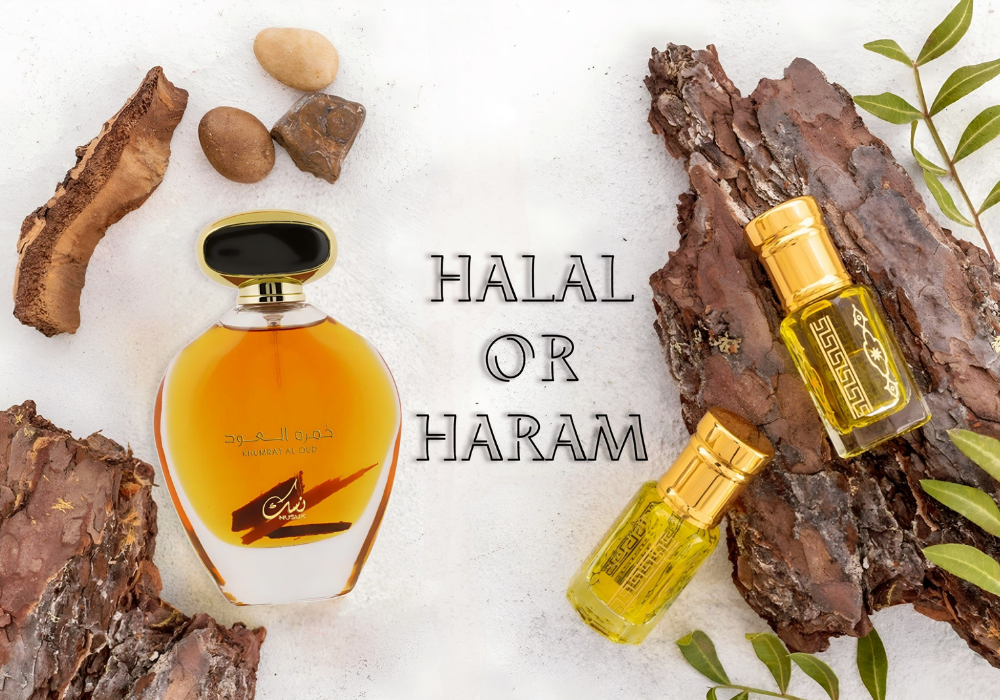
Exploring the World of Halal Perfumes and Colognes: A Comprehensive Guide
Halal Perfumes and Colognes are more than just a trend, they're a testament to the power of choice.
In fact, when it comes to personal care products, their #1 appeal is...
Halal perfumes and colognes.
Their popularity isn't surprising. The Muslim consumer, after all, seeks products that align with Islamic principles without compromising on quality or style. But if you don’t know what makes these fragrances halal or where to find them, navigating this market can be daunting.
Finding the right scent is hard work indeed.
Take for instance one devout Muslim who recently shared his struggle in finding a perfume that was both appealing and halal-certified.
This challenge didn't deter him; instead it fueled his search further
Table of Contents:
- The Islamic Perspective on Perfumes and Colognes
- Understanding Halal & Haram Concepts: The Debate over Alcohol-Based Fragrances
- Understanding Halal and Haram Concepts
- The Debate over Alcohol-Based Fragrances
- The Emergence of Halal Perfumes
- The Impact of Consumer Demand on Halal Fragrance Market
- Exploring the World of Halal Perfumes and Colognes: A Comprehensive Guide
- FAQs in Relation to Halal Perfumes and Colognes
- Conclusion
The Islamic Perspective on Perfumes and Colognes
Perfumes and colognes, the perfect fragrance companions for enhancing personal style, have been a part of human civilization for centuries. However, in Islam, these fragrances are subject to certain religious guidelines due to their composition.

A major source of disagreement within this topic is the use of alcohol in perfumes and colognes. Alcohol consumption is generally deemed haram (forbidden) within Islamic law due to its intoxicating nature when ingested. However, does this rule apply when it comes to external application? This question has led to differing views among scholars and followers alike.
The Role of Alcohol in Islamic Law
In Islam, anything considered harmful or potentially leading towards sinful behavior falls under the category of 'haram'. Consequently, consuming alcoholic beverages holds this status due to their potential harm, both physically through health complications like liver disease, and psychologically through addiction.
However, interpretations vary when it involves products containing alcohol without ingestion - such as halal perfumes or oud perfume halal offerings, where the scent itself serves the primary purpose. Therefore, unless the wearer intends to consume said product directly in any form, it shouldn't fall under prohibition despite being manufactured substances otherwise classified as 'Haram' for consumption purposes. Furthermore, many point out how the small quantities typically present don't pose a risk of inducing drunkenness, unlike the case of drinking actual liquor, making the distinction clear between the two scenarios. It is important to note here.
Understanding Halal & Haram Concepts: The Debate over Alcohol-Based Fragrances
This topic remains contentious because while some people feel comfortable wearing traditional high-end fragrances, others prefer to avoid them altogether, opting instead for newer brands specifically designed to cater to the needs of customers seeking alternatives free from controversial ingredients. By doing so, they adhere closely to the tenets of faith, ensuring no compromises need to be made on either end of the spectrum. Whether you're someone who enjoys luxury dior perfume halal or just wants something simple for everyday use, there are options available to suit everyone's unique style preferences and budget constraints too.
Finding Your Perfect Scent with
In the world of Islam, perfumes and colognes are permissible unless they're consumed directly. While alcohol-based fragrances spark debate due to their 'haram' status when ingested, many argue that external application doesn't induce intoxication or harm. This has led to a rise in halal fragrance brands catering to diverse preferences and budgets.
Understanding Halal and Haram Concepts
The principles of halal and haram are pivotal in the Islamic faith, shaping every aspect of a Muslim's life. These concepts not only influence dietary preferences but also extend to personal care items such as perfumes and colognes.
'Halal' translates to permissible or lawful in Arabic while 'haram' denotes forbidden or prohibited. The Quran, Islam's holy scripture, elaborates on these guidelines for followers with meticulous precision.
The Role of Alcohol in Islamic Law
Islamic law categorizes alcohol consumption as haram due to its potential intoxicating effects, which can lead individuals towards potentially sinful actions. This prohibition is based on numerous verses from the Quran that caution against consuming any substance inducing drunkenness.
In contrast, when it comes to external application like using alcohol-based perfumes or colognes, interpretations vary among scholars. Some argue that it doesn't fall under the same category since it isn't ingested internally. This divergence arises because although fragrances contain alcohol (usually ethanol), they're used for their aromatic properties rather than consumed for their intoxicating effects.
The Debate over Alcohol-Based Fragrances
A significant debate within the Muslim community revolves around whether using alcohol-based fragrances is considered halal or haram. Some argue that wearing such scents does not equate to drinking them and hence should be deemed permissible.
This viewpoint holds weight, especially considering most commercial use denatured - chemically altered unfit for humans - thus negating potential misuse concerns.
On the contrary end, stand those who believe that even trace amounts of non-consumable alcohol make usage impermissible, given the strict interpretation rules followed by certain sects. To resolve this quandary, many Muslims opt for exclusively certified fragrance options where production processes follow practices ensuring peace of mind for users regarding religious compliance issues associated with mainstream brands like Dior.
The Emergence of Halal Perfume
In response to the growing demand from conscientious consumers globally, we've seen the emergence of a dedicated market catering specifically to providing high-end fragrance options that align with Islamic values. In 2023 alone, the sector
Halal and haram principles govern not just dietary choices in Islam, but also personal care items like perfumes. While alcohol consumption is deemed haram due to its intoxicating effects, the use of alcohol-based fragrances sparks debate among Muslims. As a result, halal-certified perfume brands have emerged to cater to those seeking religiously compliant fragrance options.
The Debate over Alcohol-Based Fragrances
One of the most controversial topics within halal perfumery is that of alcohol-based fragrances. The crux of this debate lies within varying interpretations and understanding about Islamic law, particularly its stance on alcohol.
Differing Interpretations: A Closer Look at Community Views
In one corner are those who argue that since these products aren't consumed orally but rather applied topically, they don't violate any religious guidelines. They point out that applying such substances doesn't intoxicate or impair judgment - which is primarily why Islam prohibits consumption of alcoholic beverages.
On the other hand, some believe indirectly supporting industries involved with producing alcoholic substances by purchasing their products could be seen as promoting haram practices. Islamicity
Scholarly Opinions: Diverse Perspectives on Perfume Usage
A number of renowned scholars have shared insights into ongoing discussions surrounding the usage of perfumes containing alcohols. For instance, Sheikh Muhammed Salih Al-Munajjid has stated that external application isn't sinful unless intended for drinking or selling it for consumption purposes. IslamQA Info.
This aligns with views deeming topical applications permissible while maintaining strict prohibitions against ingestion. However, more conservative perspectives advise avoiding all forms of contact altogether - even if they're solely for fragrance uses like perfumery.
Evolving Market Trends: Emergence of Non-Alcoholic Alternatives
In response to evolving consumer preferences and diverse market trends, new alternatives have started emerging catering towards the unique needs of Muslim consumers worldwide. Setara Cosmetics IT offers non-alcoholic 'halalm' versions designed without controversial ingredients like ethanol, which is commonly found in many traditional scents. This reflects the industry's attempts to cater better towards cultural sensitivities related to ingredient sourcing and product formulation methods.
The Emergence of Halal Perfumes
As the global population becomes increasingly varied and welcoming, there is an expanding requirement for items that address particular cultural or religious needs. In the fragrance industry, this has led to an increase in halal perfumes. Grand View Research reveals:
This indicates a significant interest from consumers who are seeking perfume brands that adhere strictly to Islamic principles.
Making Scents: What Qualifies as a Halal Fragrance?
In order for any product - including perfumes and colognes - to be considered 'halal', it must meet certain criteria outlined by Islamic law (Sharia). The most critical aspect is ingredient sourcing; all components used should not contain alcohol-based compounds or animal-derived substances deemed haram under Sharia law.
Apart from the ingredients themselves, manufacturing processes also play a crucial role in ensuring the final outcome aligns closely with these guidelines. Cross-contamination during production could potentially render an otherwise compliant product unacceptable, thus meticulous attention to detail is required every step of the way to ensure strict adherence to the rules set out within Islam's dietary laws.
Halalscious. Popular Brands Offering Certified Fragrances
Demand and the rising popularity amongst the Muslim community worldwide have resulted in numerous well-known labels - both luxury and affordable alike - entering the fray to create dedicated lines specifically catering to the need. Swiss Arabian, for example, is one such brand offering a range of certified options like Layali Rouge 1, which manages to strike the perfect balance between high-end appeal and ethical considerations without compromising either aspect of the overall experience offered to customers.
The Impact of Consumer Demand on Halal Fragrance Market
Consumer demand is a powerful force that shapes the landscape of any industry. The halal fragrance market, which includes both perfumes and colognes, has been significantly influenced by this factor.
Global consumer interest in halal fragrances is not limited to Muslim-majority nations, but rather is being seen worldwide. Research indicates that Europe held the largest share of the global halal cosmetics market recently due to high product visibility and rising awareness about ethical consumption.
Driving Factors Behind Increasing Consumer Demand
An increased understanding among consumers regarding what qualifies as 'halal' plays a crucial role in driving demand for these products. This term extends beyond food items to encompass all aspects of life, including personal care products like perfume or rawchemistry pheromone cologne spray.
Beyond religious compliance, many customers are attracted to halal fragrances because they follow halal practices during production, such as excluding animal testing or the use of animal-derived ingredients - factors that appeal not only to Muslims but also to those who prefer vegan or cruelty-free lifestyles.
Evolving Lifestyle Trends Among Modern-Day Muslims
Apart from greater consciousness around adherence to Islamic principles and ethics, changing lifestyle trends among today's younger generation have greatly contributed to driving up demand within this sector too. Many young adults view perfume as an extension of their unique style rather than just something worn out of necessity.
This shift has led manufacturers to develop diverse collections catering specifically to younger demographics seeking sophisticated yet compliant options that align with their personal style preferences while strictly adhering to Islamic principles guiding permissible (halal) usage practices.
Growth Opportunities Ahead: High-End Fragrance Segment & Online Retail Channels
Looking ahead at growth opportunities within this space, one can't ignore the potential lying untapped within the high-end fragrance segment where luxury meets faith-compliance. Despite the current dominance of mass-produced affordable brands leading the way in terms of volume sales, there exists a substantial appetite among discerning consumers willing to pay premium price points provided they're assured authenticity along with the assurance of strict adherence to Sharia laws governing the production processes involved in making these exotic scents available to
Consumer demand is transforming the halal fragrance market, with increased awareness of ethical consumption and adherence to Islamic principles fueling this trend. The industry's future looks promising, especially in high-end fragrances and online retail channels where luxury meets faith-compliance.
Exploring the World of Halal Perfumes and Colognes: A Comprehensive Guide
Discover the world of Halal Perfumes and Colognes. Learn about Islamic perspectives, market trends, unique scents, and top halal fragrance brands.
Exploring Unique Scents from Halal Perfume Brands
The halal fragrance industry is a diverse and vibrant landscape. Leading brands are crafting unique, captivating scents while strictly adhering to religious guidelines.
Diversity of Floral Notes in Halal Perfumes
Floral notes hold an esteemed position within the realm of fragrances across cultures, including those crafted by halal perfume brands. They embody femininity and elegance with their delicate aromas.
Rose is one such classic note that features prominently in many perfumes due to its romantic allure, which can range from intense to soft depending on concentration levels used. Jasmine too has been embraced for its exotic touch, making it popular among consumers who lean towards lighter scents.
Beyond these two flowers, there's a wide array of floral ingredients like lily-of-the-valley or ylang-ylang that add layers of complexity into each bottle, creating enchanting compositions without any compromise on adherence to Islamic principles.
Incorporating Woody Notes in Halal Fragrances
Transitioning away from florals yet staying firmly grounded in nature's bounty, woody notes offer another dimension and depth leading to 'Halal' scent creations.
Oud stands out amongst woodsy elements owing to the rich intensity it brings forth. Its warm aroma makes it a perfect choice for colder months and evening wear.
Cedarwood provides a distinctive aromatic profile that blends well with a variety of other components, including spices and citruses, thereby offering versatility seasonally.
Sandalwood, meanwhile, imparts a creamy richness, helping balance heavier ingredients while enhancing the longevity of the overall scent composition.
All three contribute significantly to constructing full-bodied fragrant profiles that align perfectly with religious directives pertaining to ingredient sourcing and manufacturing processes.
Musk Inclusion In Halal Colognes And Perf
Halal perfumes and colognes offer a rich tapestry of scents, from floral notes like rose and jasmine to woody elements such as oud, cedarwood, and sandalwood. These fragrances are meticulously crafted in adherence with Islamic principles without compromising on diversity or allure.
FAQs in Relation to Halal Perfumes and Colognes
What is halal cologne?
Halal cologne refers to fragrances that comply with Islamic law, meaning they are free from forbidden ingredients like alcohol and animal-derived substances.
Are you allowed to wear cologne in Islam?
Yes, wearing cologne is permissible in Islam as long as it does not contain haram (forbidden) ingredients such as alcohol or substances derived from pigs.
Is perfume halal in Islam?
A perfume is considered halal if its production process and ingredients adhere to Islamic guidelines. This includes avoiding alcohol and any components derived from non-halal animals.
What is the scent used by Muslims?
Muslims often use a variety of scents including musk, amber, oud, rose, and sandalwood. These are typically found in attars - oil-based perfumes that are usually alcohol-free.
Conclusion
Exploring the world of Halal Perfumes and Colognes can be a fascinating journey. From understanding Islamic perspectives to navigating market trends, it's clear that this niche is more than just about fragrances.
The debate over alcohol-based perfumes in Islam has led to an interesting divergence of views among Muslims. But at its core, the concept of halal emphasizes ethical sourcing and manufacturing processes.
The emergence of halal perfumes shows how consumer demand influences market growth. With unique scents ranging from floral notes to woody undertones, these brands offer enticing options without compromising on religious guidelines.
So whether you're seeking personal care products aligned with your faith or simply curious about alternative fragrance choices, there's something for everyone in this diverse sector.
If you're ready to discover a new world of fragrances that aligns with your beliefs and lifestyle preferences, consider exploring our collection at Setara Cosmetics. We bring together top halal perfume brands under one roof for your convenience. Start your scent journey today by visiting Setara Cosmetics. Experience the allure of ethically sourced fragrances that cater not only to olfactory pleasure but also respect cultural values and norms.


